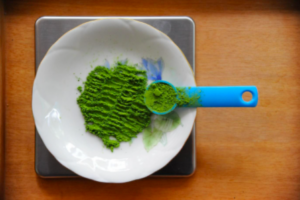
Matcha is widely celebrated for its nutritional benefits, but how much matcha is healthy to consume? Let’s break down the facts, starting with its nutrient profile and the ideal daily amount for various groups.
Nutritional Composition of Matcha
According to the Standard Nutrient List for Consumer Products (7th Edition, 2015) by Japan’s Ministry of Education, Culture, Sports, Science, and Technology, matcha is nutrient-dense. Per 100 grams, matcha provides:
- Energy: 324 kcal
- Protein: 29.6 g (including 22.6 g of amino acids)
- Dietary Fiber: 38.5 g (water-soluble: 6.6 g; insoluble: 31.9 g)
- Potassium: 2,700 mg
- Calcium: 420 mg
- Vitamin A (beta-carotene): 29,000 mcg
- Vitamin C: 60 mg
- Caffeine: 3.2 g
These nutrients make matcha a powerhouse of health benefits. However, the caffeine content requires careful consideration.
Matcha and Caffeine: How Much Is Safe?
Matcha contains approximately 32 mg of caffeine per gram, meaning a typical serving (2 grams of matcha powder) provides 64 mg of caffeine. While moderate caffeine consumption offers benefits like improved alertness and mood, excessive intake can lead to side effects.
Recommended Caffeine Intake
The European Food Safety Authority (EFSA) and other organizations suggest caffeine limits based on age, weight, and health conditions. Here’s a summary of recommended daily caffeine intake and equivalent matcha amounts:
| Age/Group | Caffeine Limit | Matcha Equivalent |
|---|---|---|
| 75+ years | 22–417 mg/day | Up to 13 g (approx. 2 tbsp) |
| 65–75 years | 23–362 mg/day | Up to 11 g (approx. 2 tbsp) |
| 18–64 years | 37–319 mg/day | Up to 10 g (approx. 2 tbsp) |
| Pregnant Women | 200 mg/day | Approx. 6 g (1 tbsp) |
For children and teens, caffeine limits are calculated based on body weight, typically ranging from 0.2 to 2 mg/kg per day.
Effects of Caffeine
- Moderate Consumption: Enhances alertness, relieves drowsiness, and may counteract alcohol intoxication.
- Excessive Consumption: May cause dizziness, increased heart rate, anxiety, insomnia, diarrhea, and nausea. Pregnant women should be particularly cautious, as excessive caffeine can affect fetal development.
Tips for Healthy Matcha Consumption
To enjoy matcha without overloading on caffeine:
- Stick to traditional servings: 1.7–2.0 grams of matcha powder per drink is ideal.
- Measure carefully: Use standard measuring spoons for accuracy. A teaspoon typically holds 2.2–2.4 grams of matcha.
- Consider your caffeine tolerance: Balance matcha intake with other sources of caffeine in your diet.
Final Thoughts
While matcha offers incredible health benefits, moderation is key. By adhering to recommended caffeine limits, you can enjoy matcha’s rich flavor and nutritional value without concern. Whether you’re sipping a traditional brew or experimenting with matcha lattes, a mindful approach ensures a healthy and enjoyable experience.
Sources:
https://chakatsu.com/basic/caffeine_matcha/

